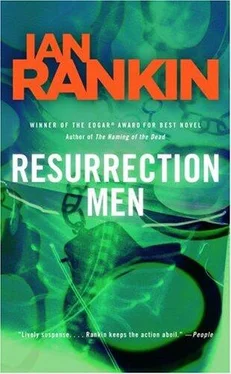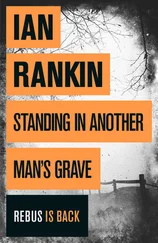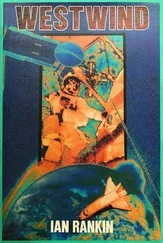“How did you know I was here?”
“I didn’t. Tried your flat first, got the answering machine.”
“And somehow sensed I wasn’t out on the town?” She settled back in her chair. “Sounds like you’re in a bar.”
“In beautiful downtown Kincardine.”
“And yet you’ve dragged yourself from your pint to call me?”
“I called Jean first. Had a spare twenty-pence piece . . .”
“I’m flattered. A whole twenty pee?” She listened to him snort.
“So . . . how’s it going?” he asked.
“Never mind that, how’s Tulliallan?”
“As some of the teachers would say, we have a new tricks–old dog interface scenario.”
She laughed. “They don’t talk like that, do they?”
“Some of them do. We’re being taught crime management and victim empathy response. ”
“And yet you still have time for a drink?”
Silence on the line; she wondered if she’d touched a nerve.
“How do you know I’m not on fresh orange?” he said at last.
“I just do.”
“Go on then, impress me with your detective skills.”
“It’s just that your voice gets slightly nasal.”
“After how many?”
“I’ll guess four.”
“The girl’s a marvel.” The pips started sounding. “Hang on,” he said, putting in more money.
“Another spare twenty pee?”
“A fifty, actually. Which gives you plenty of time to update me on Marber.”
“Well, it’s all been very quiet since the coffee incident.”
“I think it was tea.”
“Whatever it was, the stain’s not budging. For what it’s worth, I think they overreacted, sending you into purdah.”
“I’m wasting money here.”
She sighed, sat forward. The screen saver had just kicked in: I KNOW WHO YOU ARE, SUCKER scrolling right to left across the screen. “We’re still looking at friends and associates. Couple of interesting stories: an artist Marber had fallings-out with. Not unusual in the business, apparently, but this came to blows. Turns out the artist is one of these New Scottish Colorists, and leaving him out of the exhibition was a definite snub.”
“Maybe he whacked Marber with his easel.”
“Maybe.”
“And the second story?”
“That one I’ve been saving up to tell you. Did you ever see the guest list for the preview?”
“Yes.”
“Turns out not everyone who turned up was on the list. What we had were people who’d signed Marber’s guest book. But now we’ve printed off a list of the people who actually got invites. Some of them were at the exhibition, hadn’t bothered to RSVP or sign the book.”
“This artist was one of them?” Rebus guessed.
“God, no. But a certain M. G. Cafferty was.”
She heard Rebus whistle. Morris Gerald Cafferty— Big Ger, to those in the know — was the east coast’s biggest gangster, or the biggest one they knew about. Cafferty and Rebus went back a long way.
“Big Ger a patron of the arts?” Rebus mused.
“He collects paintings, apparently.”
“What he doesn’t do is smack people over the head on their doorsteps.”
“I bow to your superior knowledge.”
There was a pause on the line. “How’s Gill doing?”
“Much better since you left. Is she going to take it any further?”
“Not if I finish this course — that was the deal. How about the L-plate?”
Siobhan smiled. By L-plate Rebus meant the latest addition to CID, a detective constable called Davie Hynds. “He’s quiet, studious, industrious,” she recited. “Not your type at all.”
“But is he any good?”
“Don’t worry, I’ll slap him into shape.”
“That’s one of the prerogatives, now you’ve been promoted.”
The pips were sounding again. “Do I get to go now?”
“A concise and helpful report, DS Clarke. Seven out of ten.”
“Only seven?”
“I’m deducting three for sarcasm. You need to address this attitudinal problem of yours, or —”
The sudden hum on the line told her his time was up. It was taking some getting used to, being addressed as “DS.” She sometimes still introduced herself as Detective Constable Clarke, forgetting that the recent round of promotions had been kind to her. Could jealousy be behind the message on her screen? Silvers and Hood had stayed the same rank — as had most of the rest of CID.
“Narrowing the field nicely, girl,” she told herself, reaching for her coat.
Back at the table, Barclay lifted a mobile phone and told Rebus he could have borrowed it.
“Thanks, Tam. I’ve actually got one.”
“Are the batteries dead?”
Rebus lifted his glass, shook his head slowly.
“I think,” Francis Gray said, “John just prefers things done the old-fashioned way. Isn’t that right, John?”
Rebus shrugged, tipped the glass to his lips. Above the rim, he could see the bald man standing sideways against the bar, watching the group intently . . .
“Good morning, gentlemen!” the voice boomed, entering the room.
Six of them already seated at the same oval table. A dozen or more box-files at one end, the end where the teacher would sit.
9:15–12:45: Case Management, DCI (ret’d) Tennant.
“I trust we’re all feeling bright as buttons. No thumping heads or churning stomachs to report!” Another box-file was slammed down onto the table. Tennant dragged his chair out, causing its feet to grate against the floor. Rebus was concentrating on the grain of the table’s wood, trying to keep it in focus. When he did finally look up, he blinked. It was the bald guy from the bar, dressed now in an immaculate chalk-stripe suit, white shirt and navy-blue tie. His eyes seemed little pinpricks of devilment as they alighted on every member of the previous night’s drinking party.
“I want all those cobwebs blown away, gentlemen,” he said, slapping his hand down on one of the files. Dust rose from it, hanging in a beam of light which was streaking through the window behind him, its sole purpose to fry the eyeballs of last night’s drinkers. Allan Ward, who’d hardly said three words in the bar but who’d moved quickly from pints to shots of straight tequila, was now sporting a pair of blue-tinted wraparound sunglasses and looked like he should be on the ski slopes rather than stuck in this airless room. He’d smoked a cigarette with Rebus outside after breakfast, hadn’t said a thing. But then Rebus hadn’t felt much like talking either.
“Never trust a man when you can’t see his eyes!” Tennant barked. Ward turned his head slowly towards him. Tennant didn’t add anything, just waited him out. Ward reached into his pocket, brought out a pouch and slipped the sunglasses into it.
“That’s better, DC Ward,” Tennant said. There were a couple of surprised looks around the table. “Oh yes, I know all your names. Know what that’s called? It’s called preparation. No case can succeed without it. You need to know who and what you’re dealing with. Wouldn’t you agree, DI Gray?”
“Absolutely, sir.”
“No use jumping to conclusions, is there?”
The look Gray gave Tennant, Rebus knew Tennant had struck a chord. He was showing that he had done his research: not just names, but everything else in their files.
“No, sir,” Gray said coldly.
There was a knock at the door. It opened, and two men started carrying in what looked like a series of large collages. It took only a moment for Rebus to realize what they were: the Wall of Death. Photographs, charts, news cuttings . . . the sort of stuff you pinned to the walls of an inquiry room. The material was mounted on sheets of cork boarding, and the men placed these against the walls of the room. When they’d finished, Tennant thanked them and told them to close the door when they left. Then he got up and walked around the table.
Читать дальше












